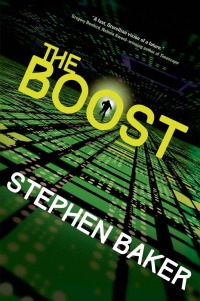The Boost by Stephen Baker
 Monday, May 19, 2014 at 10:30AM
Monday, May 19, 2014 at 10:30AM 
Published by Tor Books on May 20, 2014
If you have a processor in your head, you don't need a watch or a cellphone or a DVD player or a GPS device. Of course, you don't need a computer because you are hardwired to one, and you don't need all the complications of real sex because virtual sex is almost as good. You can eat vile-tasting vegetable cubes and fool your brain into believing you are having a delicious meal. If you do not have a processor giving you all these benefits, you are "in the wild."
In the future envisioned in The Boost, annual processor updates come from China which, having established itself as the world leader in uniformity of thought, has become the world leader in the technology that integrates computer chips and brains. The Chinese chips permit the government to download the user's memory from every chip, but privacy laws require those gates to be closed on the chips sold in the United States. Of course, you know where this is going, as does the reader after a few early chapters. You also know that allowing the government to control the content of the update isn't a good thing, at least if you prefer freedom of information to censorship and propaganda. There is, however, another nefarious scheme embedded in the chip update that is less obvious and even more intriguing than the chip's surveillance capability.
Ralf Alvare, a character in The Boost who was involved in the processors' annual update, is in the wild for the first time since his first birthday. Ralf's processor was removed after he discovered something he wasn't supposed to know. Ralf makes his way to Juarez (where the wild people go) along with his brother, who isn't wild but would like to be. Their parents, revolutionaries in their own ways, also play significant roles the story. You can pretty much guess the rest of the story.
The day will probably come when everyone has a boost, or something like it. I'd love to have one. But The Boost illustrates a plausible downside to welding dry technology into a wet brain. The cautionary aspect of the novel is more interesting than the lifeless plot, which too often features characters sitting around and talking to each other. The Boost is more a novel of interesting ideas than it is an interesting novel. Some parts of the novel suffer from an excess of expository writing and other parts seem to drift aimlessly. A number of aspects of living with the boost go unexplained, which is surprising given all the expository content.
More disturbing is the novel's absence of dramatic tension. Attempts at humor work reasonably well, but on the whole, the tone is incongruously light given the dark subject matter. Imagine the result if Orwell had added jokes and funny characters to Nineteen Eighty-Four so it would appeal to readers who are turned off by gloomy stories. There's nothing wrong with humor but I got the sense that Stephen Baker couldn't decide whether to write a funny novel or a serious one and didn't quite manage to succeed on either front.
Still, The Boost has entertainment value. It isn't dull and it moves quickly. Secondary characters have an appealing quirkiness. The ideas that are expounded are always interesting. Had the story proceeded with greater zest I would be more enthusiastic about it, but The Boost tells a fun story, even if it doesn't live up to its potential.
RECOMMENDED
Reader Comments